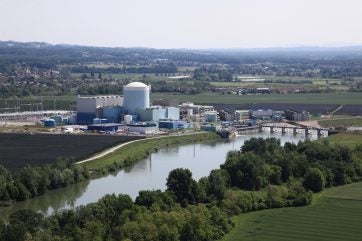
Slovenian parliamentary parties have cancelled plans for a consultative referendum on a second unit at the Krško NPP scheduled for 24 November. This came after a leaked wiretap showed the largest two parties were colluding to circumvent legal concerns over the referendum question.
The 696 MWe Krško pressurised water reactor, Slovenia’s only NPP, generates about one-third of its electricity. The plant, which began commercial operation in 1981, is co-owned by neighbouring Croatia. In 2015, a 20-year extension to its initial 40-year operational lifetime was approved. Krško is owned and operated by Nuklearna Elektrarna Krško, which is jointly owned by Croatia’s Hrvatska elektroprivreda (HEP Group) and Slovenia’s GEN Energija. GEN group says a second unit, JEK 2, could provide 8 TWh electricity a year, reducing the need to import electricity, cutting CO2 emissions, providing district heating and creating jobs.
The recording, aired on a current affairs talk show on TV Slovenija, showed the parliamentary legal office warning that a consultative referendum could only be about a question that the National Assembly had not yet decided on. Nevertheless, the Assembly went on to adopt a resolution in May discussing expansion of the Krško NPP and subsequently, earlier in October, set a date for the referendum.
Both the referendum and the resolution were endorsed in bi-partisan votes with only The Left (Levica) a single MP from the main coalition party, Freedom Movement, and two other individual MPs voting against. The wiretap, which was allegedly leaked by The Left (which is part of the ruling coalition), shows representatives of the ruling Freedom Movement and the opposition Slovenian Democratic Party (SDS) discussing procedures to get the resolution and referendum passed.
The referendum question put to voters was to be whether they “support the implementation of the Krško 2 project, which will ensure a stable supply of electricity together with other low-carbon sources”. A number of NGOs had described the working as suggestive and manipulative. Two applications had been filed at the Constitutional Court challenging the referendum. Opponents of the expansion project have been arguing that the referendum is premature because there is still too little information about the project for voters to make an informed decision .
In the wake of such concerns and media coverage about massive delays and cost overruns faced by other NPP projects power, a poll released by the newspaper Dnevnik showed public support for Krško 2 had fallen by nearly 10 percentage points since January to 59%, with over 64% of respondents saying they do not have enough information about the project.
On the day the poll was released and just four days before the official start of campaigning for the referendum, the SDS proposed its cancellation, arguing that that political credibility had been undermined. “The referendum question has been manipulated with, and the ruling coalition, which bears the biggest responsibility, is not united,” said Zvonko Černač, an MP for the SDS, which had campaigned in favour referendum. He said the wiretap, which appeared to show secret colluding to trick voters was in fact “ordinary coordination among parliamentary parties”. He added: “When things clear up and when the government that is aware of the strategic importance of continued use of nuclear energy for electricity production for peaceful purposes takes responsibility, we will file a referendum proposal again.”
Within hours, the three ruling coalition parties announced that they agreed to cancel the referendum acknowledging that the public did not feel sufficiently informed about the project. Minister of the Environment, Climate and Energy Bojan Kumer argued the referendum must be called off to prevent abuse. He accused the SDS of misleading the public with its proposal to call off the referendum because the SDS had been the one to propose the vote in the first place after which Prime Minister Robert Golob had sought unity among parliamentary parties in a bid to reach a national consensus.
The ruling Freedom Movement will now return to its original plan of drawing up a blueprint of a Krško 2 bill in November, which will include all the necessary safeguards, he said. The public will be included in the process and will also be able to decide on the investment later on, which will “ensure maximum transparency and guarantee a democratic process”.
Current estimates put the cost of Krško 2 at between €9.6-15.4bn ($10.4-16.6bn) not including financing costs. Finance Minister Klemen Boštjančič said on 21 October that Slovenia was capable of financing the project itself with a combination of equity and debt financing, but clear rules would have to be laid down.






